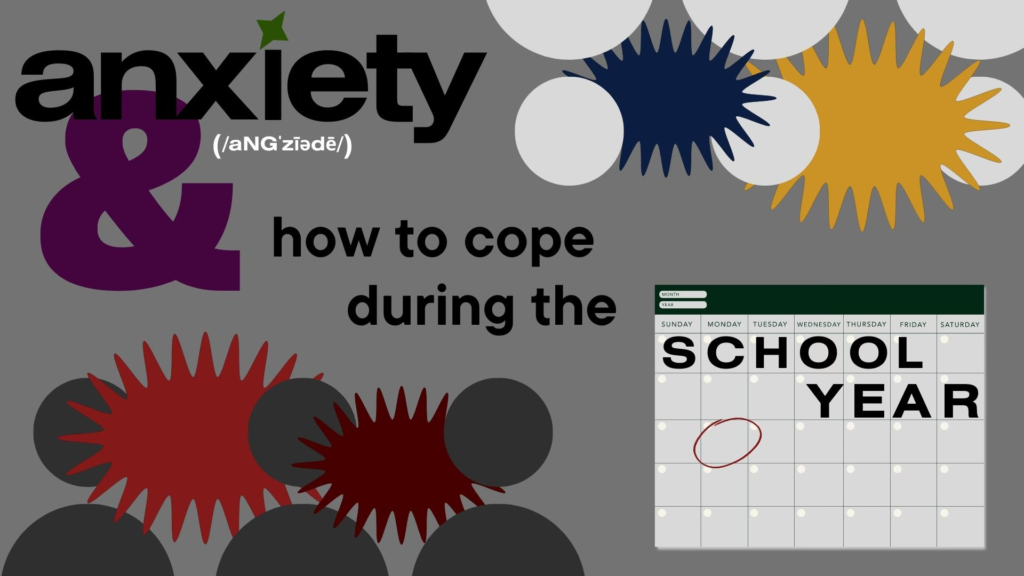As summer winds down, it is typical for feelings of anxiety and stress to come upon us as we embark on a new school year. These feelings are inevitable as each year presents new changes and challenges. Although there are many challenges that arise throughout the new school year, it is still important to get excited for all the amazing moments and events we will get to enjoy. Remembering this idea helps us create a more optimistic outlook on the year to come. Though even with this considered, being optimistic does not always eradicate our looming feelings of stress or anxiety.
In this article, we will explore good ways to cope with these feelings and how to develop useful relaxation techniques.
Before jumping into these coping mechanisms and techniques it is important to understand what anxiety is and why we feel it. Defined by the American Psychological Association, anxiety is “an emotion characterized by feelings of tension, worried thoughts, and physical changes”. In other words, anxiety is identified by certain feelings that become present when we anticipate what is to come.
Although commonly used interchangeably, anxiety is different from the concept of fear. Fear is different from anxiety as fear is the larger biological reaction to imminent danger while anxiety is an emotional reaction to the thoughts of what may happen. Oftentimes stress is what can trigger our anxiety although it may not always be the only obvious cause. Stress places a physical or mental demand on your body and can stimulate your anxiety. Stress can manifest in the forms of insomnia, attitude changes, lethargic tendencies, or other abnormal physical or mental changes. Most of the time, stress stems from a specific situation we have. In theory, when that situation settles, that stress is more likely to go away.
Anxiety on the other hand does not have to have a specific situation to focus on. This information helps us understand the differences between anxiety, fear, and stress so that we can actively attack our issues better. The mechanisms shared in this article will focus on dealing with both anxiety and stress as they often go hand in hand. These methods have helped me deal with these feelings and be able to approach new seasons of my life better.
-
- Identify Triggers
The first important step to implement is identifying what you are anxious or stressed about. You can do this in many ways—whether it is through journaling or talking about how you feel with someone else. When you identify your trigger, it can help you develop specific action plans to help you cope.
For example, when you start to feel these feelings ask yourself, “What exactly am I feeling? Nervousness, sadness, excitement? Why am I feeling this way at this current time? What is the worst that can happen? How can I actively prepare for this time? Asking yourself these questions not only helps to dissect these thoughts but also puts into perspective the weight of what you are feeling.
Often, what we stress about or get anxious about is not worth the constant cycle of mental obsession we may fall into. As we take apart these thoughts, we may even realize that we are just excited for what is to come. If we shift our thinking to being excited about what good is coming rather than being worried about what bad could happen can help put our mind at rest and allow us to fully enjoy future moments.
-
- Provide Empathy towards Others
A second step to overcoming obsessive feelings of stress and anxiety is providing empathy to others. One thing that can be difficult for us to remember is that we are not always the only ones feeling what we feel. Many people have felt to a certain extent what you have felt or are going to feel. So, in these times, it is important to lean on those around you and provide a listening ear to them as well.
Listening to others and treating them with empathy can help us realize that there are so many others who deal with issues that can be like ours. This reminds us that we are not alone and these complex feelings we experience are just a part of all our lives.
-
- Prepare
A third step I use when I begin to worry about my future is finding ways to prepare myself to make my transition easier. For example, if I am getting anxious about not being able to stay organized throughout the school year, I will develop an organization system now while I have the time. If I am worried about my upcoming season, I will put in the time now to work on my fitness and skills.
Worrying signifies that you sincerely care about your future. But instead of caring about it so much that you obsess about it, it can be more productive to actively care by doing things that will help you get closer to your goal. This helps you feel less anxious because you know that you are prepared for whatever is to come because you put in the work prior.
-
- Self-empathy – Create Self Care Routine
A fourth step is treating ourselves with love and grace however that may look to you in your life. A great way to treat ourselves well is to develop some sort of self-care routine.
According to the National Council for Mental Health, “Engaging in a self-care routine has been clinically proven to reduce or eliminate anxiety and depression, reduce stress, increase happiness, and more. It can help you adapt to changes, build strong relationships, and recover from setbacks”.
Taking care of ourselves helps us efficiently and effectively deal with everything we are faced with in our daily lives. We can make better decisions and react to new experiences easier because we are more in touch with ourselves and who we are. Self-care allows us to take the time to get to know ourselves better and establish strong values and habits in our lives.
The goal of self-care is to improve our mental and physical health, recognize our needs, create balance in our lives, and strengthen our relationships with others. For me, my self-care routine consists of going on runs, playing my instruments, and treating myself to shopping or hanging with friends after I finish my work. This system works for me because it makes me more productive and gives me something to look forward to as I incorporate this system into my daily life.
Stress and anxiety are inevitable as we approach new stages in our lives. We cannot control how or when these feelings come upon us. But what we can control is how we deal with them. Through identifying our triggers, being empathetic and opening ourselves up to others, and developing self-care routines, we can build mechanisms to help us manage our stress and anxiety.
Always remember that whatever feelings you may be feeling entering the new school year or new stage of your life are completely valid and real. There is no need to be ashamed about how you feel. There is also no need for you to feel as though you must have it all figured out before the year begins. Take it at your own pace and try to find methods that help you navigate these feelings. Hope you have a great year!



